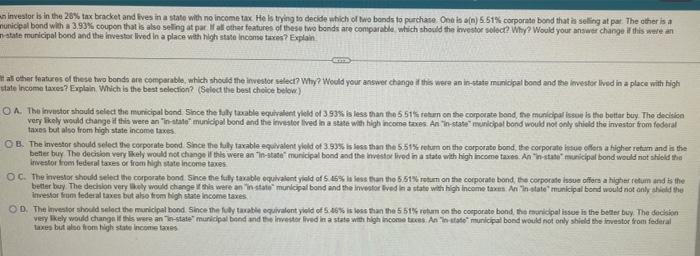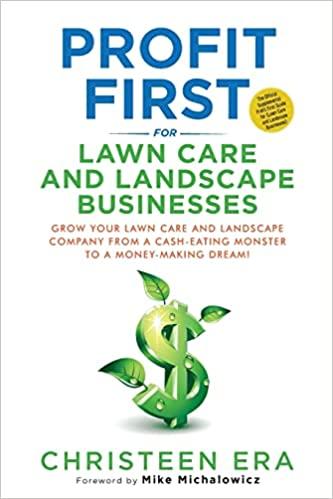
an investor is in the 28% tax bracket and lives in a state with no income tax He is trying to decide which of two bonds to purchase. One is a(n) 5.51% corporate bond that is selling at par. The other is a anunicipal bond with a 3.93% coupon that is also selling at par. If all other features of these two bonds are comparable, which should the investor select? Why? Would your answer change if this were an state municipal bond and the investor lived in a place with high state income taxes? Explain all other features of these two bonds are comparable, which should the investor select? Why? Would your answer change if this were an in-state municipal bond and the investor lived in a place with high state Income taxes? Explain. Which is the best selection? (Select the best choice below) OA. The investor should select the municipal bond. Since the fully taxable equivalent yield of 3.93% is less than the 5.51% return on the corporate bond, the municipal issue is the better buy. The decision very likely would change if this were an "in-state municipal bond and the investor lived in a state with high income taxes. An in-state municipal bond would not only shield the investor from federal taxes but also from high state income taxes OB. The investor should select the corporate bond. Since the fully taxable equivalent yield of 3.93% is less than the 5.51% return on the corporate bond, the corporate issue offers a higher return and is the better buy The decision very likely would not change if this were an "in-state municipal bond and the investor lived in a state with high income taxes. An "in-state municipal bond would not shield the investor from federal taxes or from high state income taxes OC. The investor should select the corporate bond. Since the fully taxable equivalent yield of 5.46% is less than the 5.51% return on the corporate bond, the corporate issue offers a higher retum and is the better buy. The decision very likely would change if this were an "in state municipal bond and the investor lived in a state with high income taxes An in-state municipal bond would not only shield the investor from federal taxes but also from high state income taxes OD. The investor should select the municipal bond. Since the fully taxable equivalent yield of 5.46% is less than the 5 51% return on the corporate bond, the municipal issue is the better buy. The decision very likely would change if this were an in-state municipal bond and the investor lived in a state with high income taxes. An in state municipal bond would not only shield the investor from federal taxes but also from high state income taxes







